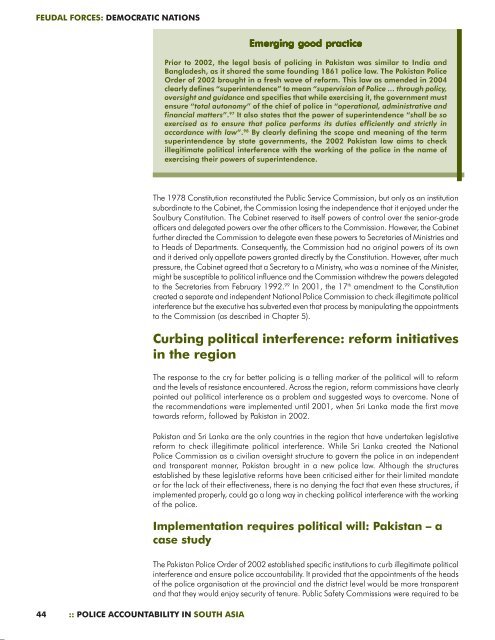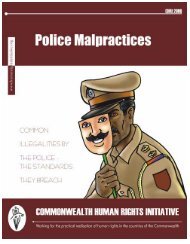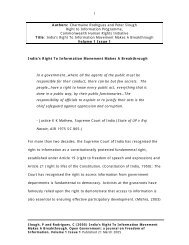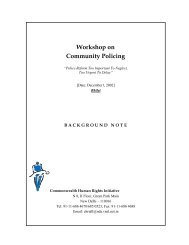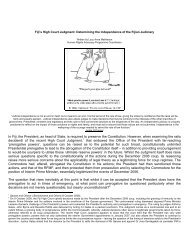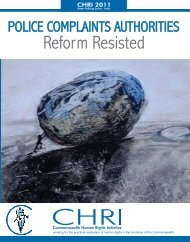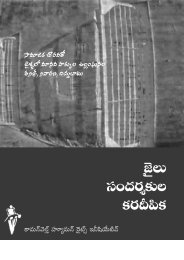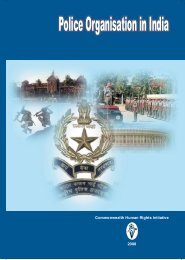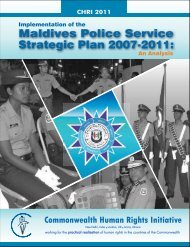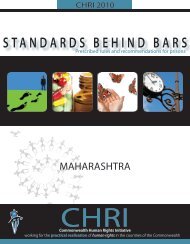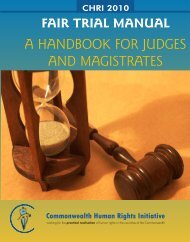Feudal Forces: Democratic Nations - Police Accountability in
Feudal Forces: Democratic Nations - Police Accountability in
Feudal Forces: Democratic Nations - Police Accountability in
Create successful ePaper yourself
Turn your PDF publications into a flip-book with our unique Google optimized e-Paper software.
FEUDAL FORCES: DEMOCRATIC NATIONSEmerg<strong>in</strong>g good practicePrior to 2002, the legal basis of polic<strong>in</strong>g <strong>in</strong> Pakistan was similar to India andBangladesh, as it shared the same found<strong>in</strong>g 1861 police law. The Pakistan <strong>Police</strong>Order of 2002 brought <strong>in</strong> a fresh wave of reform. This law as amended <strong>in</strong> 2004clearly def<strong>in</strong>es “super<strong>in</strong>tendence” to mean “supervision of <strong>Police</strong> … through policy,oversight and guidance and specifies that while exercis<strong>in</strong>g it, the government mustensure “total autonomy” of the chief of police <strong>in</strong> “operational, adm<strong>in</strong>istrative andf<strong>in</strong>ancial matters”. 97 It also states that the power of super<strong>in</strong>tendence “shall be soexercised as to ensure that police performs its duties efficiently and strictly <strong>in</strong>accordance with law”. 98 By clearly def<strong>in</strong><strong>in</strong>g the scope and mean<strong>in</strong>g of the termsuper<strong>in</strong>tendence by state governments, the 2002 Pakistan law aims to checkillegitimate political <strong>in</strong>terference with the work<strong>in</strong>g of the police <strong>in</strong> the name ofexercis<strong>in</strong>g their powers of super<strong>in</strong>tendence.The 1978 Constitution reconstituted the Public Service Commission, but only as an <strong>in</strong>stitutionsubord<strong>in</strong>ate to the Cab<strong>in</strong>et, the Commission los<strong>in</strong>g the <strong>in</strong>dependence that it enjoyed under theSoulbury Constitution. The Cab<strong>in</strong>et reserved to itself powers of control over the senior-gradeofficers and delegated powers over the other officers to the Commission. However, the Cab<strong>in</strong>etfurther directed the Commission to delegate even these powers to Secretaries of M<strong>in</strong>istries andto Heads of Departments. Consequently, the Commission had no orig<strong>in</strong>al powers of its ownand it derived only appellate powers granted directly by the Constitution. However, after muchpressure, the Cab<strong>in</strong>et agreed that a Secretary to a M<strong>in</strong>istry, who was a nom<strong>in</strong>ee of the M<strong>in</strong>ister,might be susceptible to political <strong>in</strong>fluence and the Commission withdrew the powers delegatedto the Secretaries from February 1992. 99 In 2001, the 17 th amendment to the Constitutioncreated a separate and <strong>in</strong>dependent National <strong>Police</strong> Commission to check illegitimate political<strong>in</strong>terference but the executive has subverted even that process by manipulat<strong>in</strong>g the appo<strong>in</strong>tmentsto the Commission (as described <strong>in</strong> Chapter 5).Curb<strong>in</strong>g political <strong>in</strong>terference: reform <strong>in</strong>itiatives<strong>in</strong> the regionThe response to the cry for better polic<strong>in</strong>g is a tell<strong>in</strong>g marker of the political will to reformand the levels of resistance encountered. Across the region, reform commissions have clearlypo<strong>in</strong>ted out political <strong>in</strong>terference as a problem and suggested ways to overcome. None ofthe recommendations were implemented until 2001, when Sri Lanka made the first movetowards reform, followed by Pakistan <strong>in</strong> 2002.Pakistan and Sri Lanka are the only countries <strong>in</strong> the region that have undertaken legislativereform to check illegitimate political <strong>in</strong>terference. While Sri Lanka created the National<strong>Police</strong> Commission as a civilian oversight structure to govern the police <strong>in</strong> an <strong>in</strong>dependentand transparent manner, Pakistan brought <strong>in</strong> a new police law. Although the structuresestablished by these legislative reforms have been criticised either for their limited mandateor for the lack of their effectiveness, there is no deny<strong>in</strong>g the fact that even these structures, ifimplemented properly, could go a long way <strong>in</strong> check<strong>in</strong>g political <strong>in</strong>terference with the work<strong>in</strong>gof the police.Implementation requires political will: Pakistan – acase study44 :: POLICE ACCOUNTABILITY IN SOUTH ASIAThe Pakistan <strong>Police</strong> Order of 2002 established specific <strong>in</strong>stitutions to curb illegitimate political<strong>in</strong>terference and ensure police accountability. It provided that the appo<strong>in</strong>tments of the headsof the police organisation at the prov<strong>in</strong>cial and the district level would be more transparentand that they would enjoy security of tenure. Public Safety Commissions were required to be


